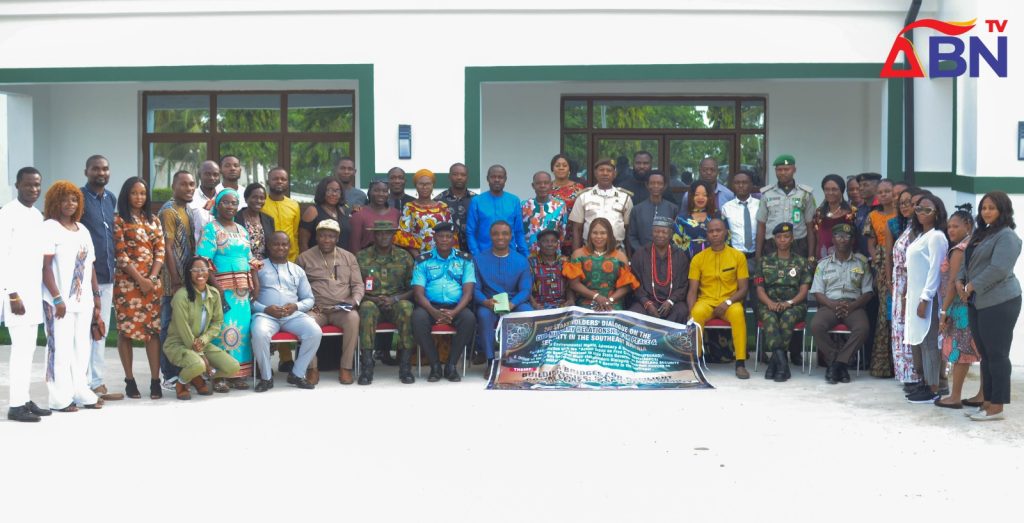
THEME : BUILDING BRIDGES FOR RESILIENT COMMUNITIES : STRENGTHENING CIVIL – MILITARY PARTNERSHIPS WITH HOMELAND SECURITY AND CIVIL SOCIETY
Date : 30th, Nov., 2023
Venue : Banquet Hall, Government House, Umuahia, Abia state.
Time : 10 .00 AM
This year event marked the 2nd edition of the stakeholders dialogue on the civil-military relations for peace and security in the South-East by Action Group on Free Civic Space (AGFCS) in partnership with Foundation for Environmental Rights, Advocacy and Development (FENRAD), the office of the Senior Special Assistant (SSA) to the Governor on Homeland security.
The stakeholders dialogue aimed at fostering collaboration and understanding between civilian and military entities for the promotion of peace and security.
Divers group of participants, including government officials, religious groups, military/paramilitary representatives, community leaders, the media and civil society organizations were brought together for this.
The event started with opening formalities, followed by welcome address/statement of purpose by the Executive Director of FENRAD – Comrade Nelson Nwafor who pointed out the Theme as “Building Bridges for Resilient communities : Strengthening Civil-Military partnerships with Homeland security and Civil society”. He commended the AGFCS and the SSA to Governor Alex Otti on Homeland security for the noble initiative and collaboration by bringing together various civil society groups, media practitioners, rights activists and stakeholders to work towards improving the security landscape and shrinking civic space in Nigeria, promising to make the event or project a yearly ritual.
In conclusion, he wished the participants a fruitful and productive deliberations.
Following suit was goodwill messages from various stakeholders.
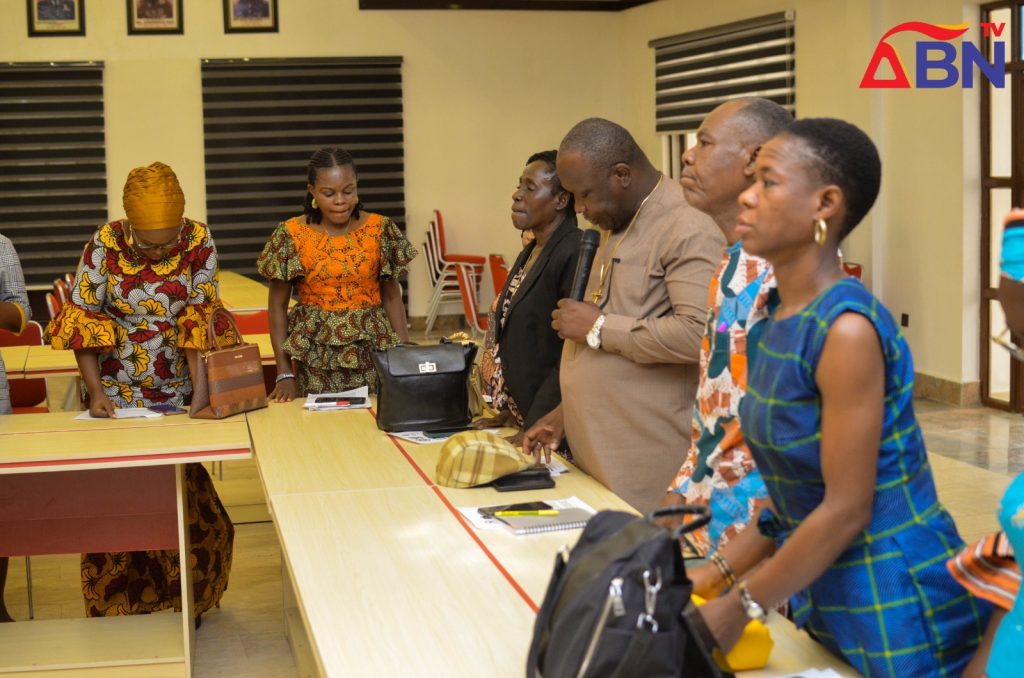
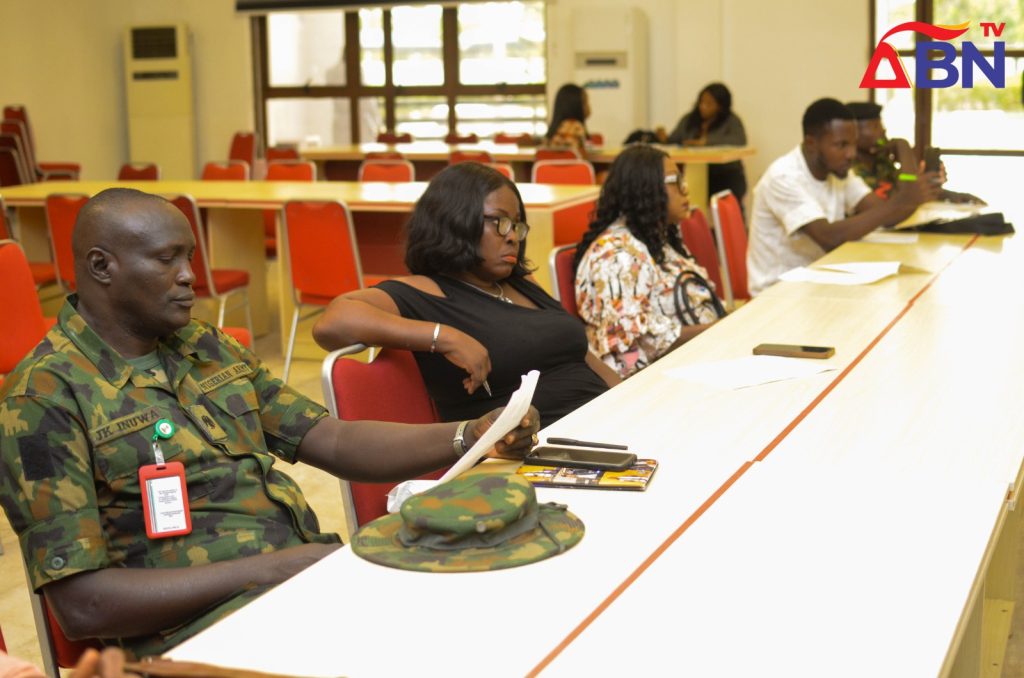
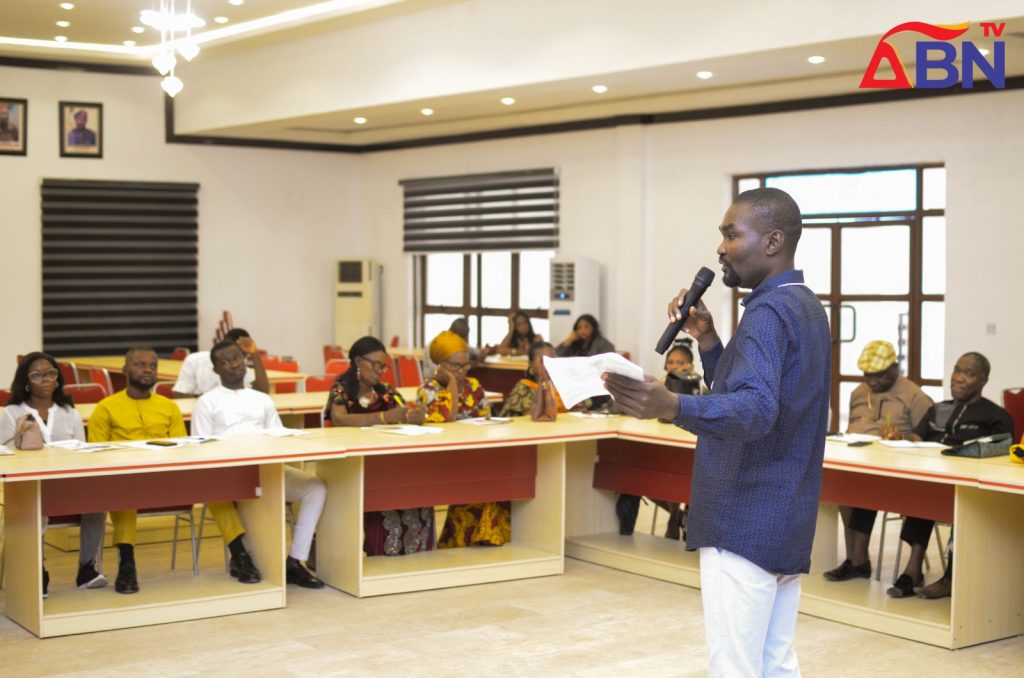
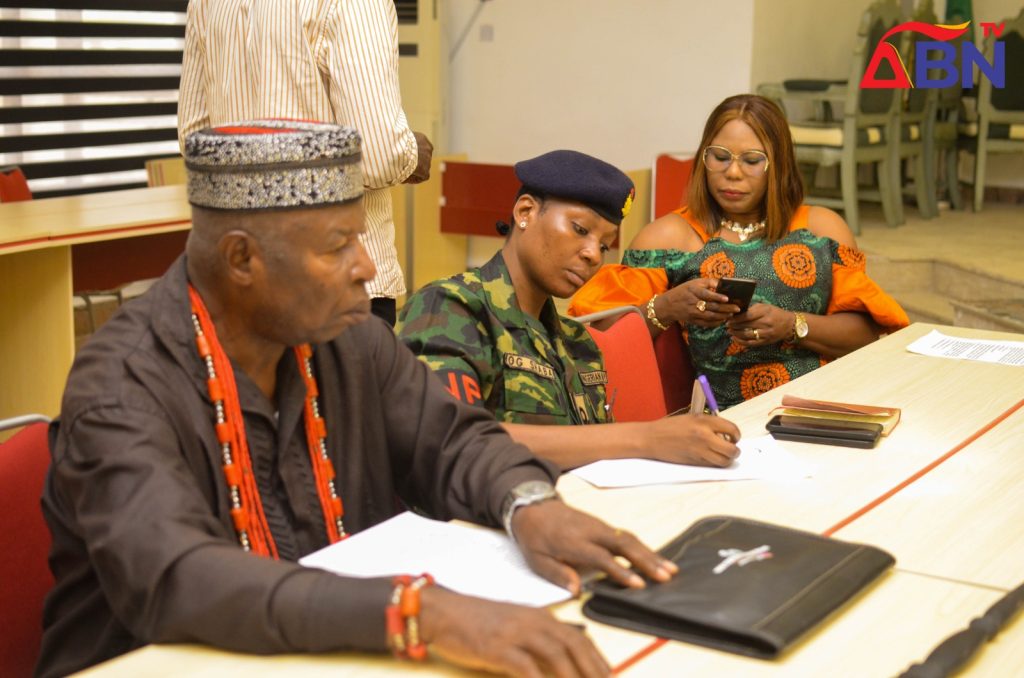
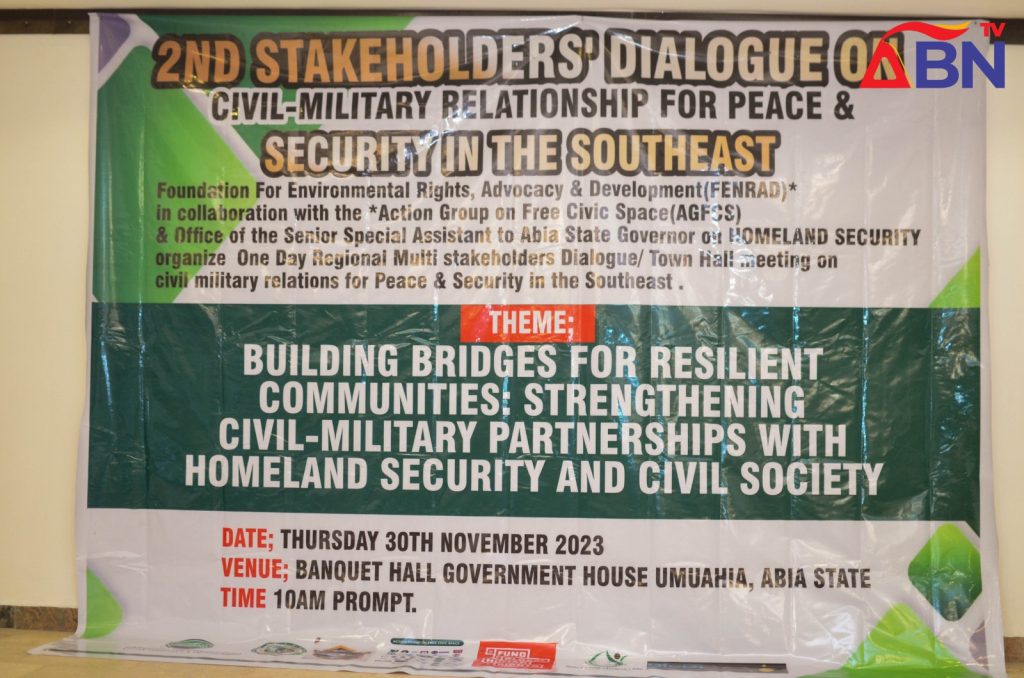
First paper presentation on Evolving a Whole of Society Approach (WOSA) to human security provisioning in Abia state and the South-east by Dr. Chukwuebuka Okoye who represented the Senior lecturer of the department of political science, University of Nigeria Nsukka – Prof. Freedom C. Onuoha who stated that the primary duty of Government is to ensure that security of lives of the citizens are protected and guaranteed under the law. Further stating that the South-East zone as other zones in Nigeria, faces multiple security challenges such as farmers-herders conflict, communal clashes, cult wars,kidnappings, armed robbery, saparatist violence, attacks by unknown gunmen. Other contributing factors to insecurity in the South-East zone include :
- Real or perceived sense of marginalization
- Failure of governance in the zone, leading to young people becoming more vulnerable to recruitment into separatist groups due to poor governance, unemployment and poverty.
- (Un)intended mismanagement of separatist agitation
- Heightened proliferation of weapons
- Availability and consumption of illicit drugs. This has lead to a rise in drug abuse and violence related crimes, thereby becoming a major public health and security concern in the South-East.
- Rogue security officials: Allegations of the complicity of military and security officials are seldomly investigated.
This spate of insecurity has impacted on people’s lives and livelihoods, disrupted social – political life, and deepened public distrust of state institutions and in seeking to arrest the insecurity in the zone, several militarised initiatives have been implemented, thereby raising concern over further securitization and militarization of civic space.Some of which include : - Operation python dance
- Proliferation of check-points
- Shrinking civic space
- Cases of forced disappearance
- Check-points induced accidents
- Flourishing extortionate policing
- Clashes between Army and IPOB
- Invasion of communities (hot spots)
- Humiliation, intimidation and harassment
- Check-points induced traffic gridlock.
He therefore, proffered solution on evolving a Whole of Society Approach (WOSA) as a formidable approach in promoting and preserving sustainable peace and security in the South-East zone.
Key points in enabling a WOSA to security provisioning in the South-East zone include –
- Security accountability : Government at national and sub-national levels should embrace CSOs as veritable watchdog for monitoring and calling attention to actions and policies of government in general.
- Practitioners- Bureaucrat-Scholar dialogue :
Experts, bureaucrats, and academicians should be brought together to provide a nuanced perspective to overall dynamics of insecurity to inform effective policy, program and security response initiatives. - Integrated posture by the South-east Security Steering Architecture (SSA) through Community Early Warning and Early Warning System (CEWEWS) for anticipating, preventing, and responding to both man made and natural threat to safety and security.
- Climate risks –
Climate change is a “threat multiplier”, exacerbating the risk factors that give rise to conflict and instability.
The South-East zone had the highest fatality and the highest displacement associated with natural disasters like flooding. The proposed South-East SSA, should have a mechanism integrating climate risk into safety and security management. - Public awareness – South-East Governors should collaborate with CSOs and the media to deliver awareness programs that instill security consciousness on residents, for every resident is a stakeholder in the promotion of security in the zone.
- Capacity building – The Governors in the South-East should run continually, training for vigilante groups and security situation awareness and sensitization programs for members of the public.
- Sustainable security funding – The Governors in the South-East should collaborate and partner with organized private sector to develop a mechanism for sustainable funding of its security initiatives and framework.
In conclusion, he identified the threats/challenges on peace and security in the South- East zone including militarization, widespread shrinking of civic space, growing distrust and limited cooperation due to tension between local residents and security forces. He opined that there is an urgent need to evolve and institutionalize a Whole On Society Approach (WOSA) in promoting and preserving sustainable peace and security in the South-East zone.
Questions, discussions and contributions followed after the presentation.
Second paper presentation on the threat of street gangsterism (cultism) engaging youngsters to prevent gangs and security agents face off by the Abia state Chairman of the Police Campaign Against Cultism and Other Vices (POCACOV) – Adamma Odefa – Wachuku.
In her presentation, she identified some crime related activities associated with youngsters in the society. Typical “horrors” of such include –
- Killing of police officers and soldiers
- Frequent confrontation with security agents
- Shocking brutal murder of the Rivers state DPO
- Killing of civilians like the Imo Traditional ruler and many others. She stated the major drivers of these gangs/cults to include – unemployment, poverty, abuse, feeling of hopelessness, and drug abuse.
Some of the breeding ground mentioned include – schools, and villages.
Major recruiters as she said were politicians, traditional rulers, religious leaders, community leaders/influencers, and organized criminal organizations.
In order to profer solution to some of these crime related challenges, she emphasized partnership with security agents, religious organizations, schools, town unions, women groups, NGOs, etc as the way forward.. Further stating a two way approach system of – Persuading those in gangs to get out while while creating a support system of counselling, mentorship, empowerment and - Dissuading those not yet enticed from getting enticed into gangs by keeping them positively busy, use of scare tactics and catching them young into positive ventures.
She called it the “POCACOV Model” which in summary involves - The use of sports, dance, drama and arts to engage youths
- Catch them young school program
- Call for partnership
Using trust as a way forward she stated that trust is everything and must exist between civilans and security agents, “Despite the eroded trust, security agents must win it back by stop acting like a Gestapo hit squad and stop extorting and humiliating civilians who may know the security agents family members, route to work, eating and drinking joints”.
In conclusion, she emphasized/entused that all hands must be on deck to safeguard the society by playing our parts in our respective communities, churches, etc. Further noting that security agents must engage troubled kids positively, in-addition, everyone must avoid isolating troubled kids but should go to the streets and speak to the kids positively.
Questions, discussions and contributions were not left out at the end of the presentation.
Keynote address on promoting community safety through Homeland security watch progress was delivered by the SSA to the Governor on Homeland security, Fire and Emergency – Mr Chukwuenye N. Alajemba, who emphasized on the importance of security to the society and the world at large while praising Governor Alex Otti for investing massively in security thereby making Abia state the safest state in the east of the Niger. He lauded the Governor for reorganizing and reforming the Homeland security which hitherto was instituted but abandoned by the previous administration. This is to complement the Nigeria Police to safeguard and protect Abians. He pointed out that dialogue between security agencies and the civil society must be encouraged as a collective effort, reduces criminality, drastically. Further stating that the Homeland security in the coming months and years will drive the collaborative effort, simply because it is the right thing to do and it is economically smart to do so as well.
For a secured environment/society promotes the economy of the area.
In conclusion, he appreciated the collaborative effort of the organizers and the government of Abia state towards solving security challenges based on mutual partnership and trust, buttressing the fact that Dr. Alex Otti as the Governor of Abia state envisions safety and prosperity of all Abians his number one priority
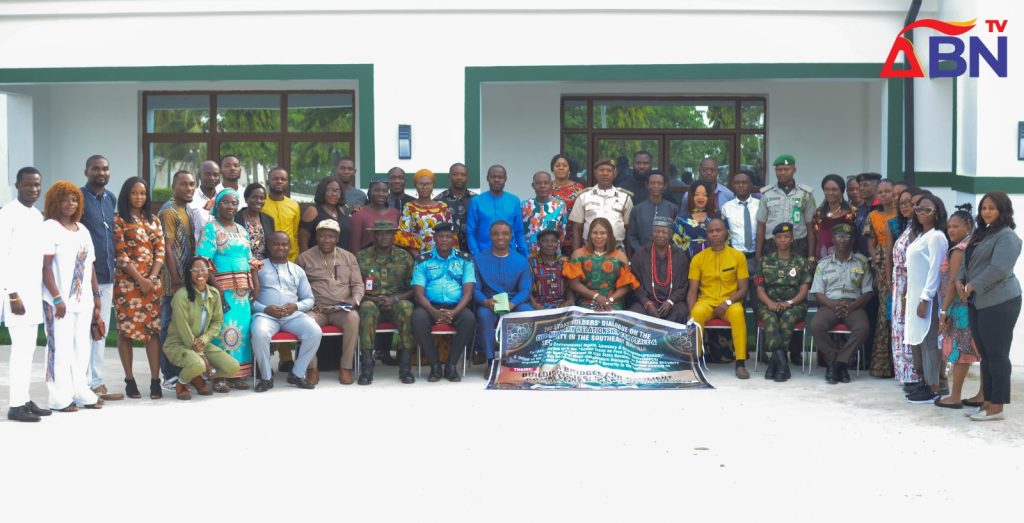
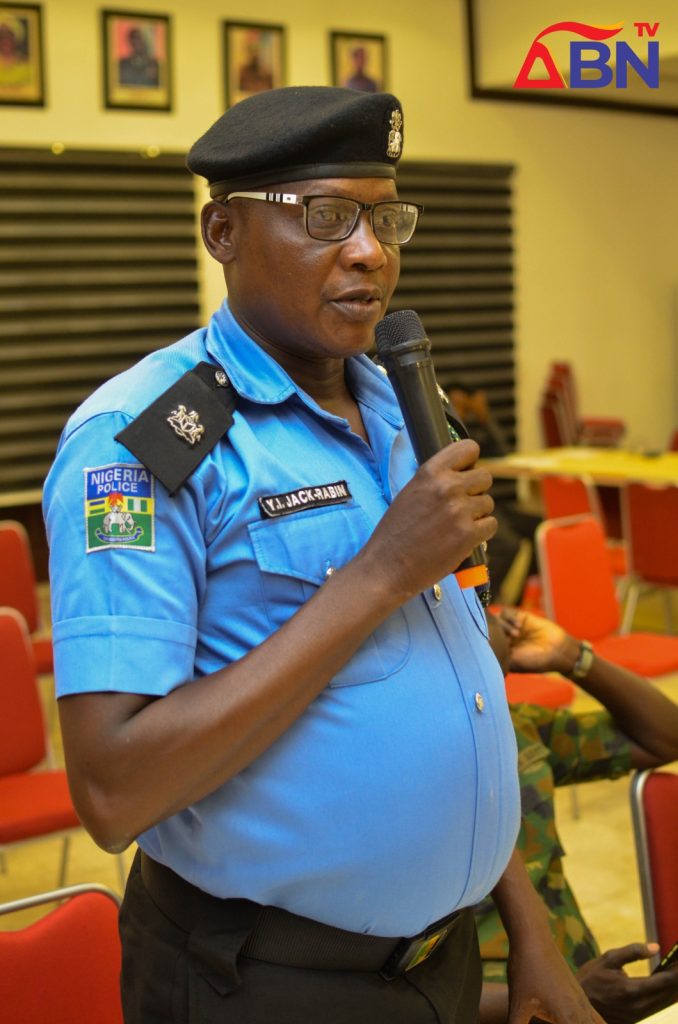
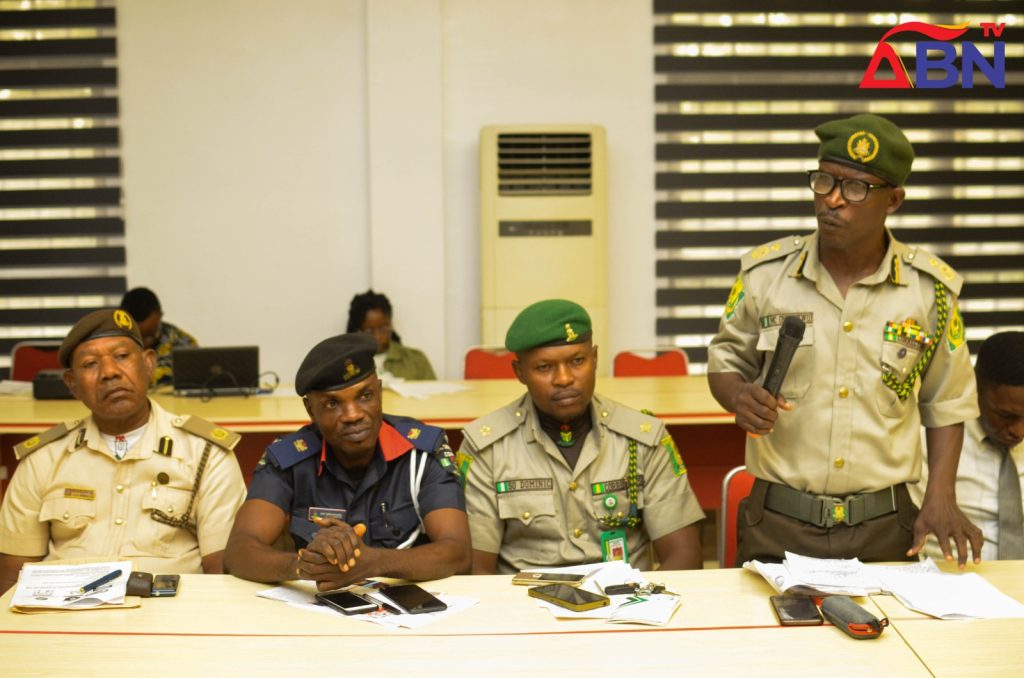
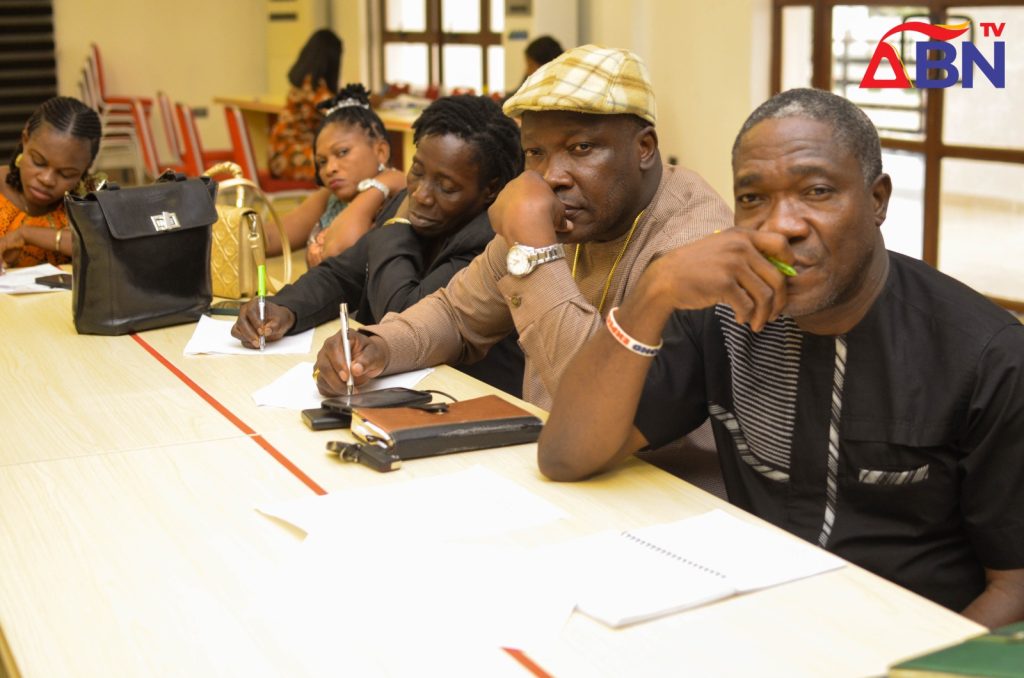
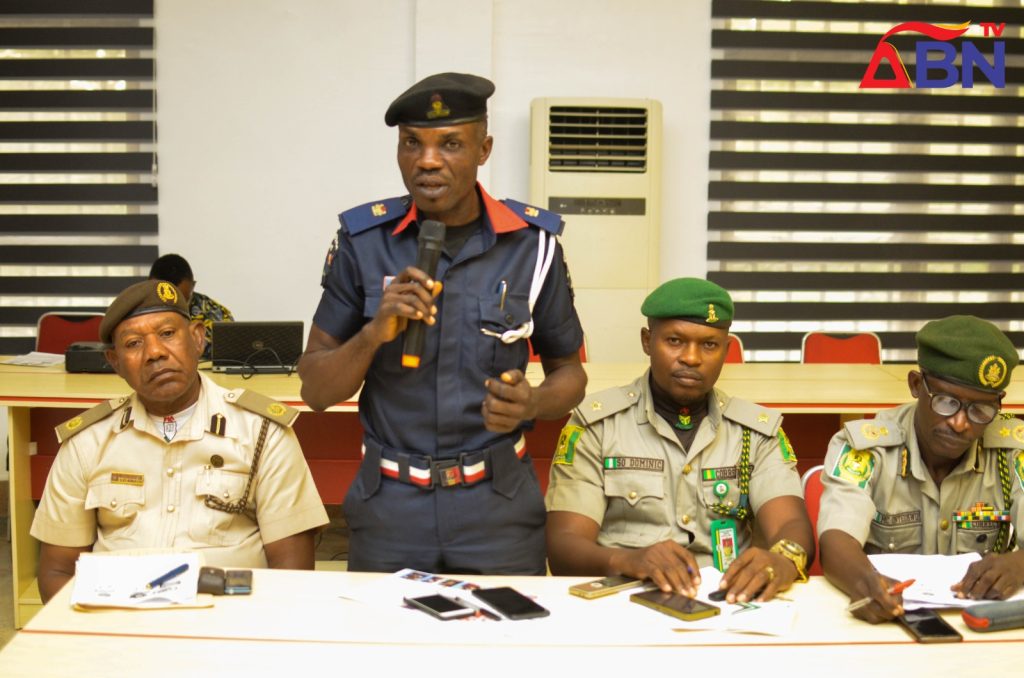
Communique presentation :
The following resolutions were adopted in the discussions by the stakeholders at the event :
- Need to rebuild public trust in the police, the military and all other sister security agencies which eroded due to policing standard and as a result of the ENDSARS Protests of 2020.
- That there is need to initiate critical reforms, through legislative advocacy, to enhance community policing as security is an inclusive affair.
- In bridging the confidence gap that now exists between the public and all the security agencies, dialogue with the relevant stakeholders and partners should be regular and sustained.
4.That the family, religious groups and traditional institutions all have a role to play in guaranteeing regional peace and security.
5.That the Nigeria Police Force and other security institutions are grossly underfunded; and this calls for an upward salary review, improved working condition, welfare package and other benefits tied to the service of security provision.
6.That there is need to look into military/police checkpoints in the Southeast region to reduce the menace of extortion and brutality road users suffer daily in the region.
7.That to further cement the relations between the uniformed services and the populace, the former need trainings, capacity-building workshops while the latter needs to explore the appropriate channel by reporting cases of misconduct to the right channels rather than take the law into their own hands.
8.That building and sustaining partnerships will help create a better policing standard, and that police need to protect those who furnish them with vital intelligence tips to win back public confidence which will allow a bottom-up policing system.
- That locals, residents and neighbours will be doing themselves good by reporting all criminal elements living within; this, it was agreed, can sustain neighbourhood watch.
10.That the police and other security agencies need to carry out sensitisation programmes on campuses and among youth-led groups to narrow the confidence gap; wrong profiling and manhandling of those wearing dreadlocks, tattoo or body piercings as “yahoo boys” or internet fraudsters is condemnable and invitation to violence.
11.That most of the crimes being perpetrated in the region have nothing to do with either the IPOB, MASSOB or other separatist group, rather a criminal agenda of some faceless groups.
12.That kinetic approach, as being witnessed in the Southeast, cannot solve the problem of separatist agitations than would inclusion and governance presence; there is a need to review security tactics being deployed to guarantee a win-win outcome.
13.That the continued detention of Nnamdi Kanu has worsened insecurity in the region leading to sit-at-home enforcement with attendant economic losses.
14.That there is need to coin and codename operations in the language people can relate to and appreciate in the region than codes like “Python Dance,” “Crocodile Smile,” which are not just scary but carry bad symbolism, unlike the ongoing “Operation Nchekwa Oshimiri.”
15.That the political elite and leaders of the region need to do more in helping to build peace by participating in fora that ensure dialogue and regional peace/security summit.
16.That Ezeship/Kingship tussle is a factor fueling inter-community clashes and rivalry.
17.That traditional rulers should not impose their political interest on their subjects, as custodians of people’s culture should be politically neutral in their affairs with locals.
18.That menaces like street cultism, gangsterism and holiganism are the drivers of crime in the region; and that to solve this, family system needs to build support to members and children.
19.That infiltration into the region of small and light weapons (SALWs), hard drugs and other illicit substances are ruining the youth in the region leading to social disorder, family collapse, and insecurity.
20.That desperate and overambitious politicians in the region who arm the youths, are threat to the region as the guns and weapons are put into other uses in post-election.
21.That security of rural areas is paramount and can be achieved with infrastructural provision like roads and streetlights which can allow for access.
22.That boundary disputes must be addressed using all windows of peace as such conflicts, when they occur, are hardly resolved easily.
23.That the dialogue on civil-military relations and strengthening peace and security in the Southeast region, as being organised by FENRAD and partners must be made a quarterly programme to allow for quarterly reporting window; and that internet facilities should be leveraged in reaching out, organising, and reporting.
In conclusion , the foregoing were the resolutions adopted by the discussions, emphasizing the need for the promotion of peace and security in the Southeast through collaboration and understanding between civilian and military/paramilitary entities.
This report provides a roadmap for promoting/ creating a more resilient and sustainable peace and security in the Southeast and the country at large.
Signed:
Ugochukwu Emmanuel
(Program officer, ICT/Media and communications, FENRAD)
On behalf of:
Comrade Nelson Nwafor
(Executive Director, FENRAD)
Kudos to the organizers: #AGFCS #FENRAD #SSA2GOVERNOR ON HOMELAND SECURITY